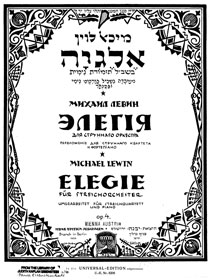Elegie for String Orchestra, op. 4 (1923) Arr. by the composer for string quartet and piano
 Michel Michelet's sheet music cover
Michel Michelet's sheet music coverFor decades Michel Michelet (1894-1995) was known in Hollywood as a leading film composer, responsible for more than a hundred film scores, including some of the classic film noir soundtracks of the 1940s and 1950s. What his movie music fans did not know was that the apparent Frenchman was actually a Jew from Kiev, born Mikhail Isaakovich Levin. Furthermore, this self-professed “Russian-French-American” composed one of the great Jewish piano quintets of the twentieth century.
As a young man, Michelet moved to Germany in 1912 to study cello with Julius Klengel and composition with Max Reger at the Leipzig Conservatory before returning to Russia shortly before World War I. He subsequently studied composition with Reinhold Gliere in Kiev, and then served as a professor first at the Kiev Conservatory – from 1919 to 1921 – and then at the Vienna Conservatory. Michelet settled in Paris in 1924 where he lived for the seventeen years. He and his wife fled the Nazis in 1942, escaping to the United States and settling in Los Angeles the same year.
Michelet’s career as a film composer began in Paris in 1929 and continued in Hollywood until 1975. Along the way he earned two Oscar nominations and countless other plaudits for his role in developing the modern film score. At the age of eighty, he retired from film work to devote his remaining years to classical music. Few in Hollywood knew of his earlier incarnation as Mikhail Levin, the name under which his Elegie for piano and string quartet was published in 1923 by the Jibneh music publishing house of Jerusalem and Berlin. Originally written for string orchestra, the piece evokes his twin Russian-Jewish musical heritage in a gorgeous modern setting of a traditional Hebrew prayer melody. In the score, Michelet indicates that it is musically derived from the Jewish Sabbath morning liturgy, specifically the traditional Ashkenazi version of Psalm 145, with its line, “I will extol you, my God and King, and bless your name forever and ever.”